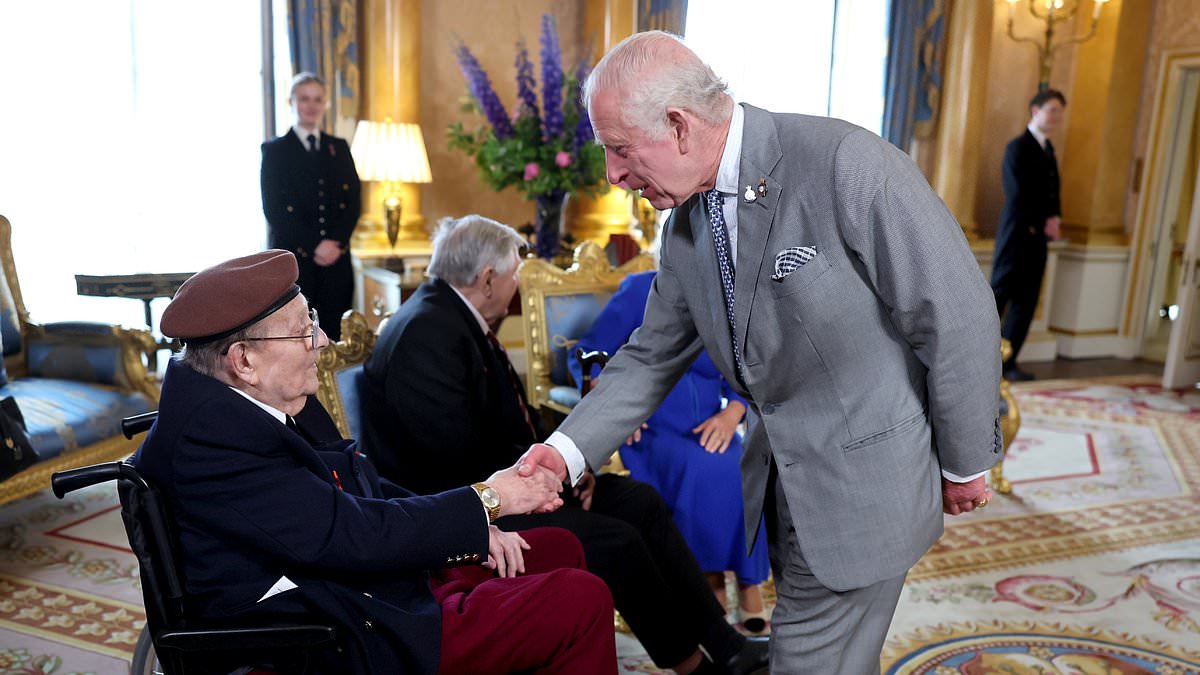King Charles was adamant he would go to D-Day commemoration events in Britain and Normandy and made it a personal goal to attend, it is understood.
The monarch, 75, will be present both at the UK’s national commemorative event in Portsmouth today and the commemorations in northern France tomorrow – in his first major international event since he began treatment for cancer.
Charles is said to have been determined to mark the 80th anniversary given it will be the last event of its kind that D-Day veterans would be able to witness.
This has been aided by a good recovery that has allowed his public duties to be brought forward by ‘about a month’, a source told The Times.
Charles and Queen Camilla will join the Ministry of Defence and Royal British Legion’s commemorative event at the British Normandy Memorial at Ver-sur-Mer.
Meanwhile, William will attend the Canadian ceremony at Juno Beach Centre at Courseulles-sur-Mer hosted by the Canadian government, alongside Second World War veterans and Canadian armed forces personnel.
The Prince of Wales will then attend the international commemorative ceremony at Omaha Beach, Saint Laurent sur Mer, later on June 6 alongside 25 heads of state and veterans from around the world.
The Princess of Wales is not expected to travel to France.
Charles and Camilla hosted four D-Day veterans at Buckingham Palace yesterday, hearing moving personal stories and seeing their poignant keepsakes.
Football boots carried on the straps of a military backpack, dog tags still bearing blood, and photos of a much cherished wife were among the mementoes shared with Charles and Camilla.
Charles, in turn, read aloud from his grandfather’s handwritten diary, recounting George VI’s D-Day entry about the breaking news of the ‘successful landings’ in June 1944.
The special meeting was filmed and will be broadcast as part of BBC One’s D-Day 80: Tribute to The Fallen on June 5.
The King and Queen listened intently as Arthur Oborne, 100, of the 49th Division of the 6th Battalion Duke of Wellington’s Regiment, told how he was shot in the lung, three days after arriving on Gold Beach.
His life was saved by his friend Walter, who was killed the next day alongside the rest of his entire unit.
Mr Oborne, from Portishead, near Bristol, said: ‘These are the dog tags which were recovered after I got a bullet through the lung, and there is blood still on some of them… He rescued me, and as a family we will never forget it. We found that he was killed the day after… We visited his grave a number of times.’
Camilla said: ‘It must be very difficult recollecting it all.’
The King appeared moved and nodded his head in agreement when John Dennett, 99, from Wallasey, told him: ‘When you look back at the lads we lost, it was colossal. It’s frightening. But that’s when you feel grateful for what you’ve been through.’
Mr Dennett, who was a Navy gunner on a landing craft at Sword Beach, took along a photograph of his wife Joyce, to whom he wrote love letters throughout the war after meeting her in England prior to leaving for D-Day.
They married two years after the end of the war.
He added: ‘I class myself as being very lucky and I appreciate being able to do what I can now and being able to enjoy the life that we all fought for.’
Camilla asked 100-year-old RAF codebreaker Bernard Morgan, who was the youngest RAF sergeant to land on Gold Beach: ‘What are your recollections of D-Day itself?’
Mr Morgan, from Crewe, Cheshire, replied: ‘When we came off the landing ship tank down on the beach, the Army were there collecting the poor soldiers who drowned on the initial landing.’
He showed Charles and Camilla the sturdy brown football boots he took with him and tied to his backpack in a bid to play whenever he could to forget his surroundings – and revealed that he had even managed a match as they sailed to Normandy.
‘These are football boots I carried all through the war. I played 12 games of football, including one on the landing craft going to Normandy,’ he said.
The King told him: ‘I don’t believe it… How fantastic. They’re remarkably well-preserved.’
Mr Morgan joked they are ‘well past their sell-by date’ and revealed that the Army v RAF match en route to D-Day had ended in a draw.
Also there was Jim Miller, who has just turned 100 and hit the headlines last week after he was presented with a 100th birthday card by the King in person.
Mr Miller, who was born in Hackney, east London, but now lives in South Wales, served in the 11th Hussars reconnaissance regiment during the Second World War and landed on Juno beach.
‘Remembrance is so important. The younger generation must learn about it and take it to heart,’ he told the King and Queen.
Showing a photo of George VI with General Montgomery, the King spoke of the wartime monarch’s frustration at not being allowed to travel to Normandy straight away.
‘My grandfather was so determined to go. He got very frustrated because they wouldn’t let him go until several days later,’ Charles said.
Reading from George VI’s June 6 diary labelled D-Day, Charles said: ‘This was my grandfather’s diary. That was his D-Day entry. ‘The news was given out at 8am that the invasion of the continent of Europe had started last night.
”The airborne troops had made successful landings in the night and had captured their objectives’.
‘So that was something.’
